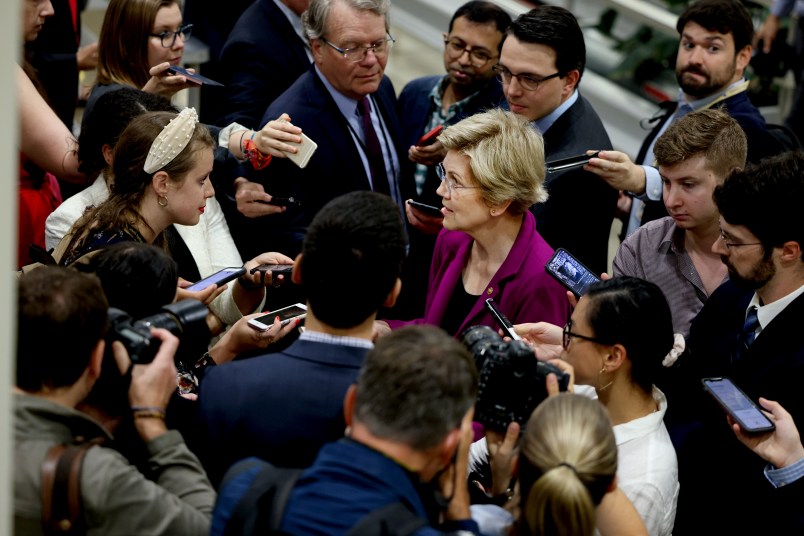Senate Democrats expressed confidence in interviews Thursday that they would not lend their votes to the scaled-down, bipartisan infrastructure deal only to be left in the dust on its much larger and much more progressive reconciliation counterpart.
“Make no mistake, there’s commitment in our caucus that one piece is not going to go forward and leave the rest of it back in the train station,” Sen. Elizabeth Warren (D-MA) told reporters Thursday.
On Wednesday night, a bipartisan group of senators reached a tentative agreement with the White House on the framework of a bipartisan infrastructure deal, involving $579 billion in new spending. As they exited the meeting, senators stressed that the two sides had agreed on how to pay for the package, long a sticking point during the weeks of negotiations.
The senators briefed President Joe Biden on the plan’s details Thursday, and he gave a press conference soon after endorsing it.
For weeks now, there has been some angst among the progressive wing of the Democratic caucus at the possibility that they’ll help the moderate-helmed group pass the bipartisan package — which will likely leave out top liberal priorities including climate provisions and raising taxes on corporations and the wealthy — only to see those same moderates jump ship when it comes time to pass the sprawling reconciliation package.
That bundle of legislation, potentially as much as $6 trillion, is expected to encompass those priorities as well as big chunks of Biden’s American Families Plan, his “human infrastructure” proposal.
“There will not be a bipartisan agreement unless there’s a firm commitment to go forward on reconciliation,” Sen. Bernie Sanders (I-VT) told reporters Thursday.
While senators have offered up different standards by which to measure the firmness of the commitment from moderates they’d need to support the bipartisan deal — Sen. Mazie Hirono (D-HI) told TPM Thursday it “could be” the order in which the two bills are voted on, while Warren jokingly suggested pinky swears — Democratic leadership is making it a little bit easier on them.
House Speaker Nancy Pelosi (D-CA) announced Thursday, in no uncertain terms, that there would not be a vote on the bipartisan deal until there’s also one on the reconciliation bill. Her spokesperson confirmed on Twitter that the plan refers to the actual reconciliation bill, not just a resolution.
“There ain’t going to be an infrastructure bill unless we have the reconciliation bill passed by the United States Senate,” she said.
Sen. Dick Durbin (D-IL), the majority whip, said that’s something Senate Majority Leader Chuck Schumer (D-NY) has been saying all along.
“Chuck Schumer has made it clear from the beginning: those Democrats who joined the bipartisan effort, we need them on board for reconciliation,” he told reporters.
The seeming Democratic unity emerges as senators are preparing to depart Washington D.C. for a two-week recess, slated to return the week of July 12. Both Pelosi and Schumer said they hoped to vote on both packages that month.
“We’ll know in the next 48 hours where we stand on this,” Durbin said Thursday of the deal negotiations.



